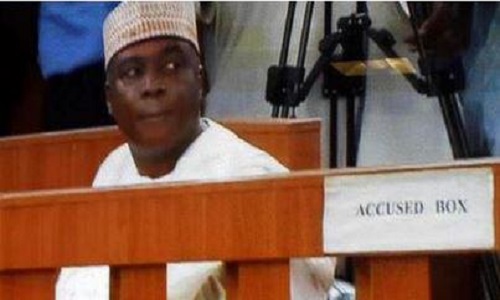
Some top legal luminaries in the country, including former justices of the Supreme Court have advised Chairman of the Code of Conduct Tribunal, CCT, Mr. Danladi Umar, to withdraw from presiding on the ongoing trial of Senate President Bukola Saraki over alleged false assets declaration to ensure fairness in the matter.
The advice was part of the communiqué of the Conference on ‘The Code of Conduct enshrined in the Constitution of Nigeria and its crucial Importance in the fight against Corruption’ held in Lagos on March 24 by the Ben Nwabueze Centre, which was released, yesterday.
Umar had on Thursday, refused to hear the motion filed by Saraki’s counsel on the CCT chairman’s alleged bias. Umar dismissed the application asking him to disqualify himself from the case, saying “that motion as far as the tribunal is concerned is of no consequence; not worthy to be entertained and is hereby thrown away.”
However, the legal luminaries, including Justice Salisu Alfa Modibo Belgore (former Chief Justice of Nigeria; Justice George Oguntade (CFR), former Justice of the Supreme Court; Justice Samson Odemwingie Uwaifo, former Justice of the Supreme Court; Prof. Ben Nwabueze, SAN; Chief Nnoruka Udechukwu SAN; Chief Mike Ozekhome, SAN; and Mr Olalekan Ojo, asked Umar to withdraw on account of the graft allegations against him and the way he has handled the trial so far. They said the following in the communique:
“It is not reasonably to be supposed or be expected that Mr. Danladi Umar can be impartial or unbiased in adjudicating the case between the Federal Republic of Nigeria (FRN) against Saraki. There can be no greater mockery of the whole notion of impartiality in any adjudicatory system than that Umar, with the threat of prosecution and removal from office for alleged corruption by the FRN hanging over his head, should have been allowed to adjudicate as presiding judge in the circumstances of this case.
“Bias on the part of Umar seems to be clearly manifest in all the circumstances surrounding the case. The manner in which the trial was being conducted by Umar manifests also a certain overzealousness that suggests at least a real likelihood of bias on the part of Umar against Saraki or a lack of impartiality,” they said.
The communique further said: “The Supreme Court was wrong in holding that the Constitution itself invests the Code of Conduct Tribunal (CCT) with a quasi-criminal jurisdiction. The Code is, in its essential character, merely a body of rules designed to regulate the civil, not criminal, behaviour of public officers, much in the fashion of the Civil Service Rules.
“The CCT, not being so listed under Section 6(5) of the Constitution of the Federal Republic of Nigeria, 1999 (as amended) as a Court, has no power or jurisdiction, derived from the Constitution, to try, convict and impose punishment on persons for a criminal offence; the decision of the Supreme Court attributing such jurisdiction to it, as jurisdiction derived from the Constitution, is null and void under sections 1(3), 6 and 36 (13) of the Constitution; also any law made by the National Assembly that confers such jurisdiction on the CCT is null and void. The Supreme Court decision on the issue of the jurisdiction of the CCT has no basis in a law validly made by the National Assembly.”


